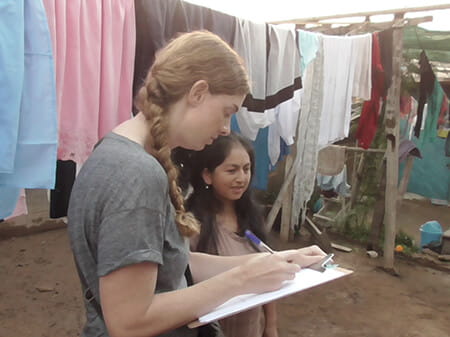As the COVID-19 pandemic continues to affect millions globally, our reliance on those caring for patients and working on prevention and treatment is greater than ever. Among those on the front lines is Walden University’s own Dr. Aimee Ferraro.
An epidemiologist and senior core faculty member in the Master of Public Health (MPH) program, Ferraro has spent the past 13 years in Peru, conducting public health research on infectious and vector-borne diseases. After arriving in her adopted country, she quickly realized another way she could make an impact: by working with low-income and vulnerable populations.

In 2016, as the Peruvian government failed to adequately respond to the Zika virus epidemic, Ferraro recognized an opportunity to create change. With help from her husband, she developed and implemented a project to educate Peruvians at the greatest risk of contracting Zika—residents of shantytowns on the outskirts of Lima.
“It was extremely difficult work, but so rewarding to know that we were really making a difference in the lives of people who had been ignored for too long,” she says.
Now, four years later, as the coronavirus spreads across the globe, Ferraro is once again using her expertise to help Peruvians most at risk. “The residents of shantytowns cannot easily implement recommendations from the World Health Organization to protect themselves from COVID-19,” she explains, highlighting the stark disparity between what most Americans take for granted and the reality for many Peruvian citizens.
“They don’t have running water to wash their hands regularly,” she points out. “They don’t live in homes that allow [for] social distancing. They don’t have refrigerators to stock up on food. They don’t have enough money saved to lock themselves inside for long periods of time.”
“But,” she says, “they can be given a decent face mask and taught how to wear it correctly. They can learn how to increase ventilation in their homes and avoid large gatherings.”
To help the scientific community learn more about how viruses spread among vulnerable populations, Ferraro is working on a study to determine the unique modes of COVID-19 transmission among residents of shantytowns. She hopes her findings can be leveraged to find practical solutions for reducing the risk of the disease among those in poor, crowded communities.
"I hope my study will find other solutions for this vulnerable population so I can develop clear risk-communication messages for future public health interventions,” she says.
Bringing Clean Water to Families in Need
One of the greatest challenges for low-income Peruvian families is lack of access to running water. Ferraro says many of the families she works with depend on water brought into communities in cistern trucks. This system is not only expensive but often results in impure water that can cause diarrheal disease.
So when Ferraro heard of a clean-water initiative through a family friend whose daughter was invested in the cause, she knew she wanted to get involved. She now distributes eco-friendly water bottles with special carbon filters to families who participate in her study.
“I wanted to give them something meaningful that could last over time,” she says. “The water bottles were a perfect solution.”
Ferraro hopes to expand the project to more families and is currently working with an organization to set up a fundraising campaign and distribute the water bottles to more families.
“The other great thing about this initiative is that the organization donates all their proceeds to a nonprofit that works with vulnerable populations on various projects throughout the country,” she says. “It might start with something as simple as a water bottle, but this initiative offers an interesting ripple effect for social change.”



